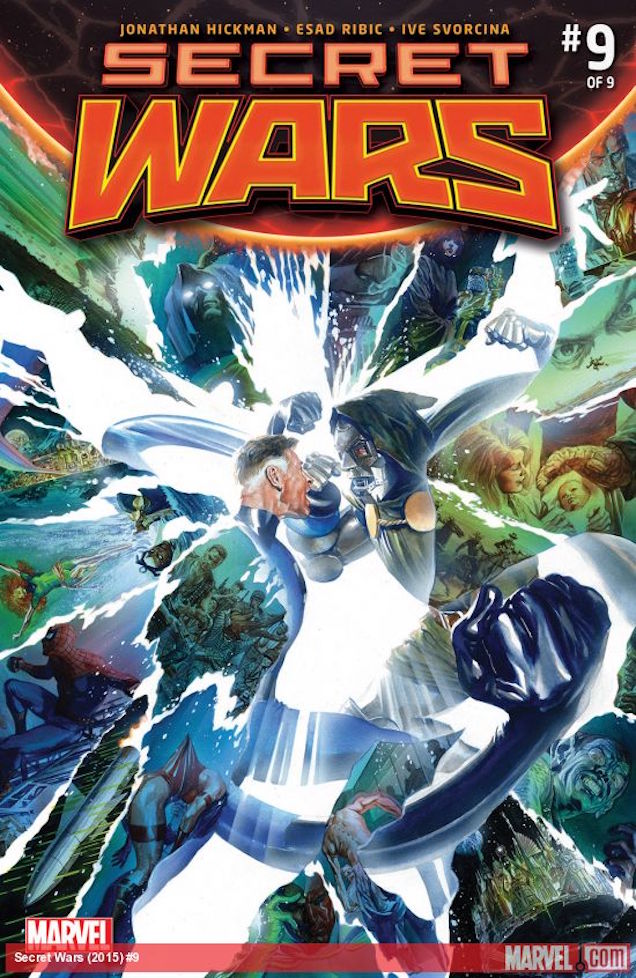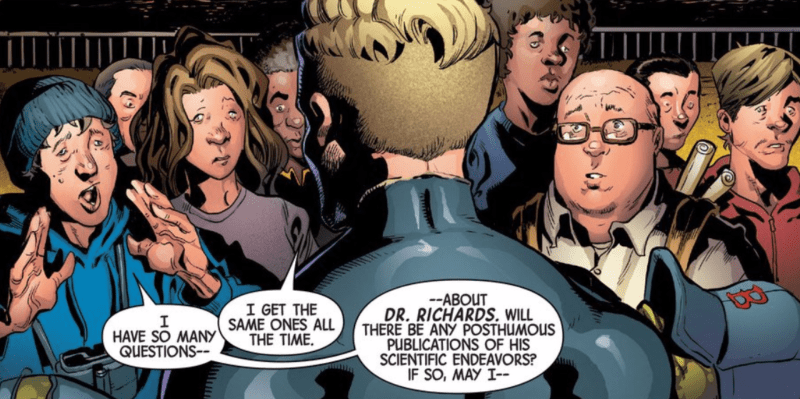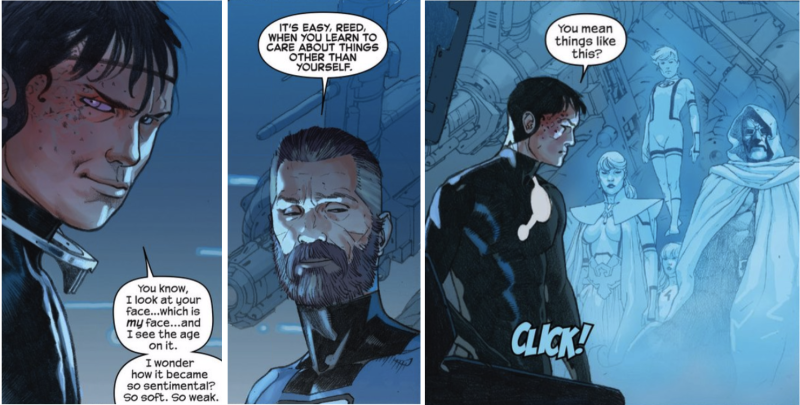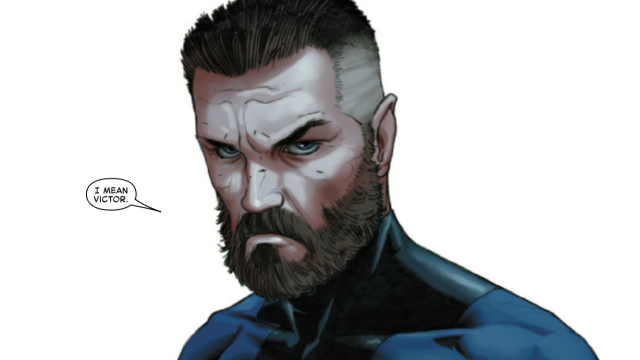The final issue of Marvel’s everything-changing event series bids farewell to the fictional father figure of its superhero reality. Reed Richards doesn’t exit the stage quite the way we’ve been led to believe, either.
Spoilers follow.

The end of Secret Wars comes a few months deep into an aftermath that’s well underway. Marvel Comics’s All-New, All-Different initiative is a complete re-imagining of their universe’s characters and status quos. The changes so far have given readers a Spider-Man who runs a global tech conglomerate, a female Wolverine and a Hulk who isn’t Bruce Banner. All of this takes place eight months after the end of Secret Wars. The Fantastic Four is no more, and the Human Torch and the Thing fight evil on different super-teams. The whereabouts of Reed Richards (the original, not his evil alt-reality counterpart) have been an ongoing mystery for a while, with allusions to his apparent death.

Secret Wars #9 — out this week from Jonathan Hickman and Esad Ribic — shows what happened to Mr Fantastic just before the Marvel Universe gets reborn.
Secret Wars has been happening on a cosmic scale. It is set on a patchwork planet created by Dr Doom after snatching omnipotence from mysterious beings who were orchestrating the end of all existence. What’s made the series the best mainstream crossover event in recent memory, though, is that it’s actually a focused character study. It’s largely been concerned with Victor Von Doom and the way that the archvillain has embodied godhood, but there’s been an increasing focus on his lifelong enemy, too. After surviving the erasure of the multiverse, Reed Richards has found himself in a reality where his life has been stolen. He’s been focused on working with the Black Panther, Namor and other survivors to come up with a way to defeat Doom-turned-god. The scenes where he reckons with what’s been lost, like the ones below from Secret Wars #6, have been wrenching.

The difference between superficial and meaningful change can be hard to chart in superhero comics. Death, estrangement and other reversals are just storytelling tools used in panels and word balloons. But Marvel Comics’ latest mutations have been consequential in game-changing ways. The company whence Iron Man, Captain America and the X-Men sprung isn’t just a comics publisher anymore. Even before its acquisition by Disney five years ago, Marvel was acting on ambitions to make their characters the source of an ambitious multimedia business. Those ambitions have been largely met, manifesting in a reality where multiple Marvel-branded movies and TV shows come out every year.
This issue’s best subtext is in how Hickman comments on the real-world shifts that are seemingly influencing how Marvel is grooming its stable of characters. Despite rampant speculation, it’s never been explicitly confirmed that 20th Century Fox’s command of the Fantastic Four film rights is the reason that Marvel isn’t publishing a monthly series featuring their beloved super-family. But the way that the publisher has reconfigured its fictional landscape is clearly prioritising characters whose film and TV rights are under Marvel’s control. For example, the X-Men franchise is another one whose multimedia rights are controlled by a non-Marvel/Disney entity so the new Marvel Universe is a place where mutants are becoming extinct while the Inhuman population booms. Those are the same Inhumans who are a major part of Disney-owned ABC TV show Agents of SHIELD. If they are what they seem to be, editorial decisions like these — driven by outside factors — are a big change from how Marvel used to craft its storylines.
That change is deeply felt in Secret Wars #9, which reads like an explosion of all the series’ various attributes. There are giant battles of epic scale, shot through with heated monologues revealing how characters see themselves and others. The issue ends with a glimpse of the new reality Marvel’s heroes inhabit and teases the reason that Miles Morales got his mother back. Early on, as the Black Panther and Doom face off in a prelude to the series’ final showdown, Doom sneers at the attacks on his rule, characterising them as “machination”.
It’s a sly beat that reminds readers that all superhero universes are the aggregate results of decades of tweaks, feints and left turns. Machinations, both metafictional intratextual, aren’t anything new in cape comics. What’s changing now is the fact that the successes of various adaptations appear to be filtering back into the wellspring that the TV shows and movies came from. It’s an undeniably plausible reason that, say, Daredevil has a secret identity again.
There’s also a sense of closure here, as Hickman returns to characters and scenes from his tenures on various Marvel series. The Black Panther counsels young charges in his kingdom like he did in New Avengers #1, but it’s the beginning of a new universe — and not the impending death of many — that serves as a backdrop. Epitomised by a stellar stint on the Fantastic Four family of titles, Hickman’s time at Marvel linked many of the publisher’s franchises into a sprawling mega-story, concerned in part with the hard choices superheroes have to make to preserve entire societies. Fittingly, Secret Wars ends with Reed Richards peacefully resigning himself to the idea of a new Marvel Universe built off of the emotional resonances of the old one. He can’t be part of it now, but serves in a role that’s a tacit acknowledgement that he’ll always be the foundation stone upon which Marvel’s superhero successes were built.

Comments
6 responses to “Secret Wars’ Finale Says Goodbye To The Marvel Comics Of Old”
It was a very weak ending to what was essentially a decent event. It is a shame that the tie-ins were so strong compared to the main story line.
Reed is too important to Marvel’s history to be just left behind. Pretty sure he’ll come back eventually, but yeah his prolonged absence will help completely break the F4 team.
Except it’s not the beginning of a new universe. It’s the old universe recreated back to the way it was before Doom destroyed it all to stop the Beyonders. Nothing’s changed. Everything that happened prior to Secret Wars still happened.
Secret Wars was – and was always going to be – just an event, like Age of Apocalypse and others of that ilk before it.
Yeah, I never really understood the hype for this being practically a complete reboot of all Marvel continuity, as DC have done before, most recently with Flashpoint.
I haven’t read much of the post Secret Wars stuff yet, but it seems like a lot of what defines Marvel as now being ‘All-New, All-Different’ was either previously established already, such as Kamala being Ms Marvel, or at least had the groundwork laid out, such as Logan’s death so that X23 could become Wolverine.
Not that I’m complaining, the Secret Wars series itself, and it’s build-up in Hickman’s Avengers and New Avengers runs has absolutely amazing.
I loved the fight between Doom and Reed at the end, and “Ok then, if you both agree…”
Great end to the series, kind of made wish I knew more of the history with Doom and Reed, as this confrontation was presented as being a culmination of their entire rivalry, but not knowing much of it didn’t hurt my overall positive reaction to this finale.
One way I though it might have ended while reading it, was after Molecule Man turns down helping Doom or Reed as neither bought him food, was Miles Morales would somehow show up while they were fighting and then Molecule Man would let him decide the fate of everything, as Miles actually did give him food earlier in the series. Would have been hilarious, that someone giving someone else a burger from their pocket was what the multiverse’s recreation was decided on, but it would have been way out of tone for the whole saga.